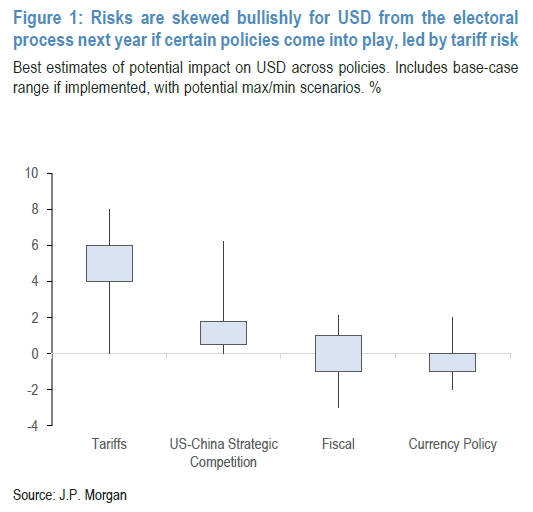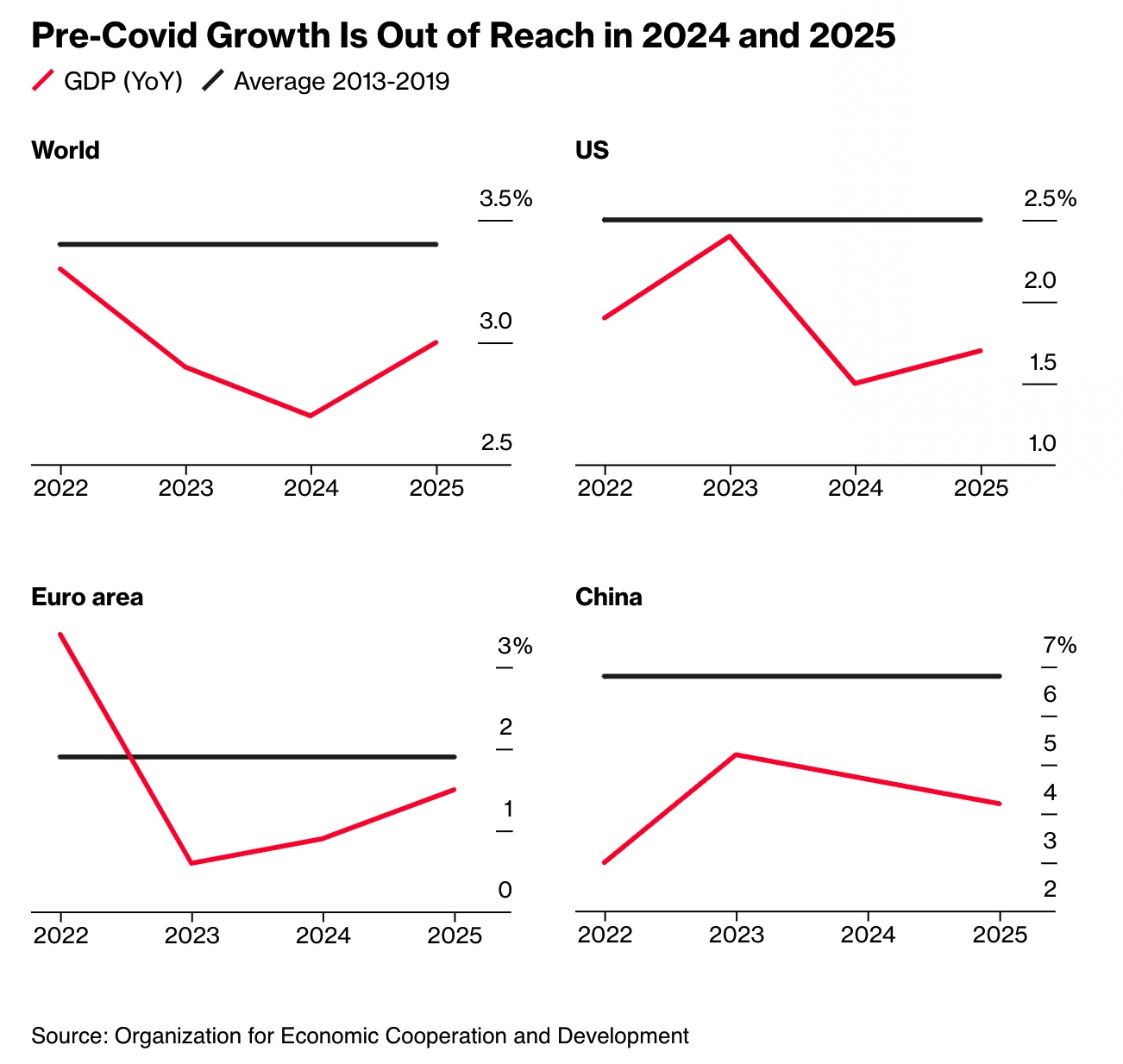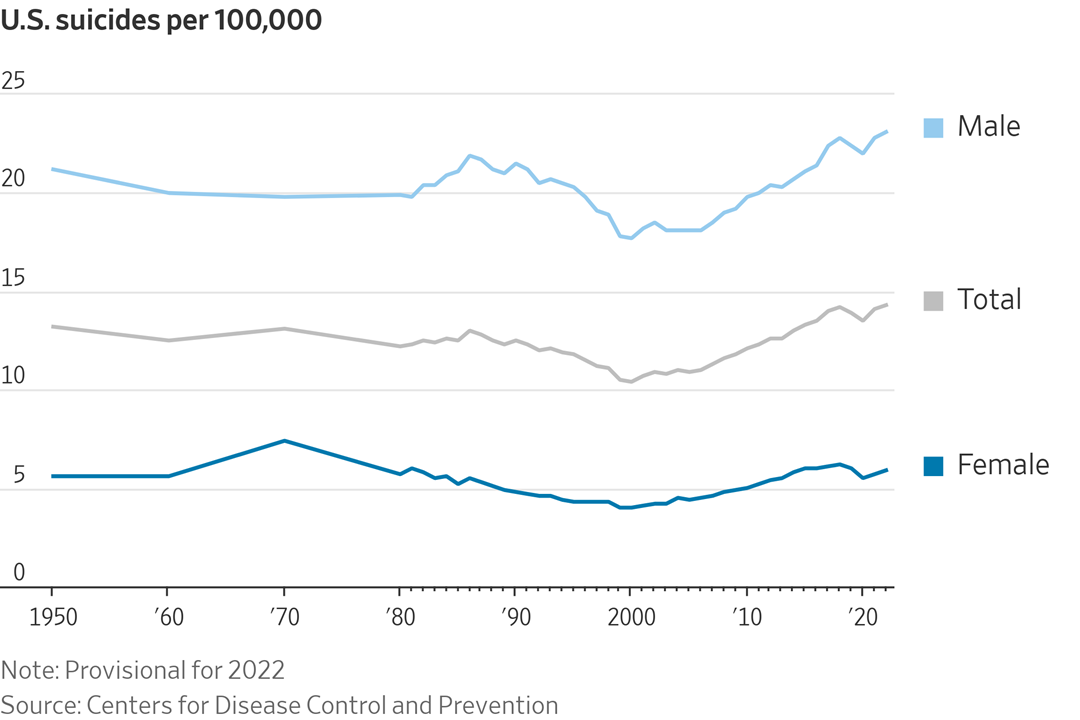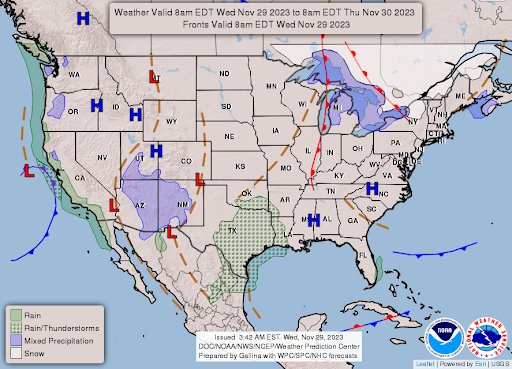USDA Extends NSIS Trial for Pork Industry by 90 Days

ERP for 2022 ‘suspended’, applications being taken but processing of payments on hold
|
Today’s Digital Newspaper |
Abbreviated format as I am speaking early this morning at the Montana Grain Growers Association meeting.
— Equities on Tuesday: U.S. stock indices posted gains Tuesday, with the Dow up 83.51 points, 0.24%, at 25,416.98. The Nasdaq rose 40.73 points, 0.29%, at 14,281.76. The S&P 500 gained 4.46 points, 0.10%, at 4,554.89.
Equities today: Asian and European markets were mixed to firmer in overnight trading. U.S. stock indexes are pointed toward firmer openings. In Asia, Japan -0.3%. Hong Kong -2.1%. China -0.6%. India +1.1%. In Europe, at midday, London -0.1%. Paris +0.4%. Frankfurt +0.9%.
— Gold moved to within 1% of its record high, rising 1.4% Tuesday to $2,039.70 an ounce. Copper added 1%, to $3.80.
— Oil prices more than rebounded from Monday's decline, with West Texas Intermediate crude jumping 2.1% Tuesday, to $76.41 a barrel. Brent traded up $1.70 or 2.1% to close at $81.68. Prices rallied on the possibility that OPEC+ will extend or deepen supply cuts. The group will meet on Thursday to discuss 2024 after initially pushing back the meeting last week.
— Gas prices in the U.S. have seen a continuous decrease for over 60 consecutive days, and there may be more relief for consumers at the pumps. The average price for a gallon of regular gas currently stands at $3.25, as reported by AAA. This reflects a 5-cent decline from the previous week and a remarkable 63-cent decrease since September. This average is somewhat inflated by high-cost gas states such as Hawaii, Washington, and California. Even in California, where gas prices tend to be higher, prices have dropped by 43 cents over the past month to $4.88 per gallon. While it's common for gas prices to decrease after the summer driving season ends, the extent of the current decline is notable, especially considering the anticipation of supply disruptions due to international conflicts.
— The U.S. dollar sank to a three-month low on Tuesday after U.S. Federal Reserve Governor Christopher Waller flagged the possibility of lowering the Fed policy rate in the months ahead if inflation declines further. The dollar has retraced the majority of the August-October spike, as global markets continue to embrace the idea that the Fed is not as hawkish as previously feared, that the U.S. economy is starting to slow, and the chances for a hawkish surprise from the Fed continue to decline. The Dollar Index dropped 0.44% and fell below 103 for the first time since Aug. 14.
— JPMorgan: 2024 election to boost dollar on trade-war tension. JPMorgan predicts that the U.S. dollar is likely to strengthen due to the potential for a divisive U.S. election contest between President Joe Biden and former President Donald Trump. The bank believes that such a contest would raise the prospects of a trade war, and investors should pay attention to the impact of potential trade tariffs on currencies. The strategists at JPMorgan suggest that renewed tariff risk would be favorable for the dollar. While the focus has been on the Chinese yuan, there is the possibility of the impact broadening to other foreign exchange (FX) rates.
The bank notes that if the current polling trends persist, a Biden-Trump matchup is likely, and it points out that under Biden's leadership, tariffs imposed by Trump have largely remained in place. JPMorgan emphasizes that any expansion of U.S. tariffs on nations and trading blocs beyond China, including Europe, Mexico, and broader Asia, could significantly affect the strength of the dollar. They estimate that a universal 10% tariff could boost the trade-weighted value of the dollar by 4% to 6%, impacting growth-sensitive currencies in a widening trade war.
However, the bank suggests that fiscal policy may have less impact on currency markets as the election unfolds. While fiscal changes were significant factors in foreign exchange risk during previous elections, it's less clear now whether fiscal policy can distinguish U.S. growth from that of other countries.

— Agriculture markets yesterday:
- Corn: March corn futures fell 1 3/4 cents to $4.73 1/2 and near mid-range. Prices hit another contract low.
- Soy complex: January soybeans rose 16 3/4 cents to $13.46 1/2, near the session high, while January meal fell $6.10 to $430.50 and January soyoil surged 188 points to 52.94 cents.
- Wheat: March SRW wheat rose 11 cents at $5.72 and near the session high. March HRW wheat closed up 21 1/4 cents at $6.17 3/4. Prices closed near the session high and hit a contract low early on. March spring wheat futures rose 13 1/2 cents to $7.13 1/4.
- Cotton: March cotton rose 34 points to 79.60 cents, a mid-range close.
- Cattle: February live cattle futures jumped $4.00 to $172.825, while nearby December futures rallied $2.875 to $171.65. January feeder cattle futures led the complex higher, rising the daily limit of $8.25 to $221.05.
- Hogs: Futures rebounded strongly from last week’s breakdown, with nearby December rising $1.05 to $68.925 and most-active February leading the way higher with a $2.10 jump to $69.025. After having dipped to the mid-$80.00’s area last week, pork cutout leapt $4.58 to $88.75.
— Ag markets today: Corn, soybeans and wheat held in relatively tight ranges during a quietly traded overnight session. As of 7:30 a.m. ET, corn futures were trading narrowly mixed, soybeans were mostly 1 to 2 cents higher, SRW wheat was 4 to 5 cents higher, HRW wheat was 8 to 9 cents higher and HRS wheat was 3 to 4 cents higher. Front-month crude oil futures were around $1.50 higher, and the U.S. dollar index was modestly firmer this morning.
Expanded limits for live cattle and feeders. Tuesday’s limit-up performance in January feeder cattle triggered expanded price limits of $12.25 for today’s session. The daily trading limit for live cattle futures will be expanded to $10.00 today. Active followthrough buying in those markets would suggest Monday’s trade was capitulation to the downside that put in lows.
Cash hogs continue to weaken, pork reverses lower. The CME lean hog index is down another 67 cents to $71.66 (as of Nov. 27), extending the seasonal price decline. The pork cutout value fell $3.95 on Tuesday, as primal bellies dropped more than $16.00, erasing most of the gains from the previous day.
— Ag trade: South Korea purchased 65,000 MT of corn to be sourced from the U.S., South America or South Africa and canceled a tender to buy 50,000 MT of non-GMO soybeans.
— ERP for 2022 has been “suspended” and offices will take applications, but processing of payments are on hold, according to a source.
— USDA extends NSIS trial for pork industry by 90 days. USDA announced (link) that the Time-Limited Trial for New Swine Inspection System (NSIS) plants will be extended for an additional 90 days, providing certainty for our pork industry and ensuring participating plants can continue operating at increased line speeds.
Details: In March 2021, a court order issued by the U.S. District Court for the District of Minnesota vacated the component of USDA’s New Swine Slaughter Inspection System (NSIS) that eliminated line speed limits for participating establishments. As a result, all NSIS establishments were required to operate at line speeds not exceeding 1,106 head per hour as of June 30, 2021. In November 2021, USDA’s Food Safety and Inspection Service (FSIS), in consultation with the Occupational Safety and Health Administration, invited NSIS establishments to participate in a time-limited trial (TLT), during which the establishments have been allowed to operate at an increased line speed while collecting and submitting data that would be used to evaluate the impact of increased line speed on workers.
FSIS contracted with a third-party team of worker safety experts to evaluate the data submitted by the swine establishments. The team of experts determined that the data submitted was not sufficient to evaluate the impact of increased line speeds on worker safety in NSIS establishments. Accordingly, to obtain the data necessary to inform any future rulemaking, FSIS is commissioning a study that will independently generate the necessary data for expert analysis. FSIS as noted will extend the TLTs for up to an additional 90 days while the study is being designed by the team of experts.
FSIS will send letters to the six swine establishments with requirements they will need to continue to meet to operate a TLT during the 90-day period, including keeping in place measures outlined in their worker safety agreements. The agency will follow up with additional communication to the public once the details of the study, including its duration, are determined.
Congressional pressure. The announcement comes after Rep. Brad Finstad (R-Iowa) and Sen. Chuck Grassley (R-Iowa) led a bicameral group of 18 Members of Congress on November 2, 2023, in sending a letter to USDA Secretary Tom Vilsack, urging the agency to immediately issue an extension of the Time-Limited Trial for the six NSIS pork processing plants. House Ag Chair G.T. Thompson (R-Pa.), while welcoming the short-term extension, said he remained “concerned that the Biden administration’s actions on pork processing line speeds only removes the certainty that the nation’s producers, processors, and consumers deserve. As USDA moves toward a more permanent solution, it is my hope the department operates with transparency to ensure our pork processing facilities can maintain full operational capacity and protect our nation’s food supply."
The National Pork Producers Council (NPPC) applauded the announcement. “Amidst a historically dire pork market, we thank Secretary Vilsack for his actions to preserve harvest capacity, which provides market power to producers when selling hogs,” said NPPC President and Missouri pork producer Scott Hays. “Without the extension, pork producers would incur additional losses of nearly $10/head in Q1 and Q2 2024.”
— USDA has reported a significant increase in bird flu cases, affecting millions of birds. This month, approximately 5.78 million birds have been affected, a substantial rise from the 1.37 million reported last month (link). The states most heavily impacted by the recent outbreak in the last 30 days include Minnesota, Iowa, Ohio, and Oregon. In Iowa, infections this year are occurring at a rate three times higher than those detected in October, November, and December of the previous year, according to the Iowa Capital Dispatch (link).
In terms of international trade, China's customs administration had imposed restrictions on poultry shipments from numerous American states during the previous outbreak. These restrictions remained in place even after the cases subsided. However, China recently lifted restrictions on poultry imports from specific states, including Kentucky, Oklahoma, Delaware, North Carolina, Maine, Maryland, and Texas, according to USDA’s report earlier this month. Nonetheless, bans on shipments from 31 other states are still in effect as of Nov. 15.
— Minerva CEO: South America will account for half of global beef exports in five years. South American will account for 50% of global beef exports in five years, up from 40% presently, according to beef packer Minerva’s Chief Executive Fernando Queiroz. Minerva, which bought plants from competitor Marfrig to boost its presence in South American countries this year, believes processing grass-fed cattle is a competitive advantage for firms that operate in the continent. South America also boasts lower labor costs compared to countries like the United States, Queiroz said. “We have the best global platform to mitigate risks,” Queiroz said, referring to the current low availability of cattle in the U.S. that is affecting rival companies there.
— India announced a significant commitment to its free food grains program, with plans to allocate 11.8 trillion rupees ($141.63 billion) over the next five years. This initiative, aimed at ensuring food and nutrition security, is intended to benefit 813.5 million people, as stated by Information Minister Anurag Thakur. The government recently extended the program for five more years, and this extension received cabinet approval on November 29. Despite the substantial spending associated with this program, Indian government officials are confident that they will meet their fiscal deficit target for the current financial year ending on March 31, which is set at 5.9% of GDP.
— The World Trade Organization (WTO) is facing challenges in gaining momentum for its agriculture negotiations in preparation for the 13th Ministerial Conference (MC13) scheduled for Feb. 24 in Abu Dhabi. A virtual mini-ministerial meeting was held to encourage WTO members to make progress in these negotiations. The host, UAE Foreign Trade Minister Thani Bin Ahmed Al Zeyoudi, emphasized the critical nature of the situation and urged officials to narrow the gaps in agriculture negotiations.
One of the long-standing issues in the negotiations is public stockholding (PSH), where developing and developed countries have been in disagreement for some time. WTO Director-General Ngozi Okonjo-Iweala also urged the participating officials to make progress in the lead-up to MC13, which will also be held in the UAE.
Bottom line: The inability to reach an agreement on PSH is a significant obstacle in the agriculture negotiations and will impact the prospects of advancement at MC13. Finding consensus among all WTO members on contentious issues has historically been a challenging endeavor.
— Negotiators from Qatar, Egypt, and the U.S. are working to extend the truce between Israel and Hamas, which is set to expire in the next 24 hours. President Biden has called for an end to the conflict and criticized Hamas, emphasizing the importance of Israelis and Palestinians coexisting peacefully. Hamas has handed over 12 more hostages to the Red Cross and pledged to maintain the truce if Israel continues to release Palestinian prisoners. Egyptian and Qatari officials are exploring the possibility of extending the truce for an additional two days, as reported by Al-Qahera News, a Cairo-based broadcaster known for representing the Egyptian government's perspectives. U.S. Secretary of State Antony Blinken is scheduled to arrive in Israel on Thursday.
A sixth set of hostages is expected to be released by Hamas today as diplomatic efforts continue to maintain the ceasefire. During the first five days of the truce in Gaza, Hamas has already released 81 hostages, primarily women and children. In exchange, Israel has freed 180 Palestinians from prison, many of whom were detained without charges. The White House expressed hope that more Americans may be released today, though only one American-Israeli citizen, a 4-year-old, has been released so far since the truce began, which has been disappointing to U.S. officials.
— The U.S. Department of Transportation Maritime Administration has issued a warning to ship operators about growing threats in the Red Sea, particularly considering recent attacks on commercial vessels navigating this crucial trade route. The advisory advises caution when transiting through these areas and highlights the evolving security risks in the region. This increased threat perception has led to rising insurance premiums for ships operating in the region. Some shipping companies, such as Denmark's Maersk and Israel's ZIM Integrated, have chosen to reroute their vessels to mitigate the risks.
Ships with connections to Israel face an elevated risk due to the ongoing Gaza war. Recent incidents include the seizure of the cargo ship Galaxy Leader on November 19th by Yemen's Houthi rebels, which was linked to Israeli billionaire Rami Ungar. Additionally, a Liberia-flagged chemicals tanker connected to Israel's Ofer family was also attacked. These developments have raised concerns about the safety of vessels with ties to Israel in the Red Sea region.
— General Motors is taking steps to rebuild trust on Wall Street as it approaches 2024, following a challenging year marked by labor strikes and setbacks in its electric and autonomous vehicle initiatives. GM, headquartered in Detroit, intends to boost its quarterly dividend for the next year by 33%, reaching 12 cents per share. Additionally, the company plans to initiate an accelerated $10 billion share repurchase program. It will also reinstate its 2023 guidance, which factors in an estimated $1.1 billion impact on earnings before interest and tax (EBIT-adjusted) due to approximately six weeks of labor strikes by the United Auto Workers union in the United States.
GM's CEO Mary Barra finalizing budget to offset new labor agreement costs. The long-term strategy includes reducing the capital intensity of the business, enhancing product development efficiency, and further cutting both fixed and variable costs, she said.
— China is exerting pressure on Russia to negotiate more favorable terms for the Power of Siberia 2 pipeline project, according to the South China Morning Post (link). This pressure is described as at a "presidential level." Russia is looking to diversify its natural gas exports as it faces a decline in sales to the European Union (EU) market. The project is seen as a way for Russia to partially compensate for this loss by exporting natural gas to China. The pipeline, if completed, would divert 1.8 trillion cubic feet of natural gas per year that previously supplied Europe to north China, offering a significant boost to Beijing’s energy security.
— Rep. Robert Garcia (D-Calif.) has initiated a formal process to push for Rep. George Santos' (R-N.Y.) expulsion from the House of Representatives. This move is considered the most serious threat to Santos, who is currently facing indictment. The process involves a privileged motion introduced by Rep. Garcia, which requires the House to hold a vote on Santos's expulsion within two legislative days. It comes shortly after the release of a bipartisan House Ethics Committee report that uncovered "sufficient evidence" of criminal wrongdoing on Santos's part.
— 3,900 car dealers express frustration over unsold EVs, seek relief from mandate. These dealers have written a letter to President Biden, expressing their frustration with the accumulation of unsold EVs on their lots and requesting relief from the administration's stringent EV sales mandates. The dealers acknowledge there are excellent battery electric vehicles available for consumers, but highlight the demand for EVs is not keeping pace with the increasing supply prompted by government regulations. Dealers are experiencing a 103-day supply of EVs compared to 56 days for traditional gasoline-powered cars, and it takes them significantly longer to sell an EV. One of the key reasons for slow EV adoption, according to the dealers, is the high cost of EVs, which is a barrier for many consumers. Additionally, challenges such as limited access to home charging for apartment renters and unreliable public charging networks contribute to consumer hesitancy. Concerns about reduced driving range in extreme weather conditions are also mentioned.
The dealers call for a reconsideration of the government's proposed tailpipe emissions rules, which aim to make EVs comprise two-thirds of car sales by 2032. They argue that while EVs may be popular in certain urban areas, price and convenience are more significant factors for consumers elsewhere. The letter suggests that aggressive climate policies may not be as popular as some Democrats believe, highlighting the importance of allowing consumers to make their own choices when it comes to vehicle preferences.
Link to more details via Bloomberg.
— Argentina's incoming president, Javier Milei, recently visited Washington, DC, where he had a meeting with Jake Sullivan, America's national security adviser. During his trip, Milei's team also engaged with officials from the International Monetary Fund (IMF). Argentina currently owes the IMF more than $40 billion. Milei, who identifies as an "anarcho-capitalist," secured 56% of the votes in Argentina's presidential election run-off in mid-November. His inauguration is scheduled for December 10.
— U.S. shoppers spent $38 billion online during Cyber Week, which includes the five days from Thanksgiving through Cyber Monday. This surge in online spending exceeded expectations, with a 7.8% increase compared to the anticipated 5.4% growth, according to data from Adobe Analytics. The National Retail Federation (NRF) reported that over 200 million shoppers made both online and in-store purchases during the Thanksgiving weekend, marking a 2% increase from the previous year and surpassing the expected 182 million shoppers. Despite the strong start to the holiday shopping season, the NRF is maintaining its forecast of 3% to 4% growth in retail sales for the November-December holiday period, as consumers continue to seek deals.
On average, consumers spent $321.41 on holiday-related purchases, slightly down from the previous year's $325.44. The number of online shoppers reached 134.2 million during the weekend, offsetting a slight decrease in in-person store visits.
One notable factor contributing to increased spending was the use of "buy now, pay later" (BNPL) offers, which boosted activity by approximately $940 million, a significant 42.5% increase compared to the previous year and well above the expected 18.8% increase.
Discounts played a crucial role in attracting consumers, as many still perceive prices to be elevated for various goods and services. The holiday season's performance will be a key factor in shaping the U.S. economy's conclusion for 2023.
— OECD: Strong growth moderating, predicts 2.7% for next year. OECD updated its world economic forecasts and suggested that the stronger-than-expected growth is now moderating, and will be just 2.7% next year, after an already weak 2.9% in 2023. The pace will only pick up to 3% in 2025, according to the assessment. Perhaps the biggest change, however, was in its forecasts for Israel, which the OECD expects to experience a short but significant slowdown. It projects that Israeli economic growth will fall from 2.3% in 2023 to 1.5% in 2024.
The OECD said the risks to the forecast are tilted downwards amid heightened geopolitical tensions, an uncertain outlook for trade, and the risk that tight monetary policy could hurt firms, consumer spending and employment more than expected. “Inflation is easing, but growth is slowing,” OECD Chief Economist Clare Lombardelli said in a statement. “We are projecting a soft landing for advanced economies, but this is far from guaranteed.”
The OECD expects rate cuts in the U.S. will only begin in the second half of 2024, and not until the spring of 2025 in the euro area. That contrasts starkly with the expectations of markets, which are currently pricing the Federal Reserve and the European Central Bank will ease policy as soon as the first half of next year.
Bottom line: “In summary, the global economy is grappling with inflation, slowing growth, and mounting fiscal pressures,” Lombardelli said.

— Felipe Afanador has taken on the role of special assistant for agriculture at the EPA. Before this position, he served as a confidential assistant to the undersecretary for marketing and regulatory programs at USDA.
— America’s suicide rate last year reached its highest level since 1941, reflecting broad struggles to help people in mental distress. Nearly 50,000 people in the U.S. lost their lives to suicide in 2022, according to a provisional tally from the National Center for Health Statistics. The agency said the final count would likely be higher. Link to details via the Wall Street Journal.

— NWS weather: Below average temperatures continue Wednesday for the East Coast and South with freeze-related advisories for the Florida Panhandle and south Georgia... ...New storm system to bring threat of severe thunderstorms and heavy rain from Texas into the Mississippi Valley by Thursday... ...Unsettled weather to arrive for the Pacific Northwest and California late Wednesday through Thursday.

|
KEY LINKS |
WASDE | Crop Production | USDA weekly reports | Crop Progress | Food prices | Farm income | Export Sales weekly | ERP dashboard | California phase-out of gas-powered vehicles | RFS | IRA: Biofuels | IRA: Ag | Student loan forgiveness | Russia/Ukraine war, lessons learned | Russia/Ukraine war timeline | Election predictions: Split-ticket | Congress to-do list | SCOTUS on WOTUS | SCOTUS on Prop 12 pork | New farm bill primer | China outlook | Omnibus spending package | Gov’t payments to farmers by program | Farmer working capital | USDA ag outlook forum | Debt-limit/budget package |






